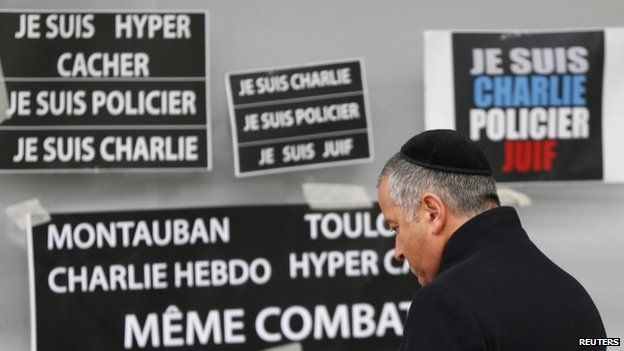'Not safe': French Jews mull Israel emigration
- Published

The grim and violent climax to the Paris hostage crisis was followed with horror wherever the news is watched. Israel's community of French-speaking Jews followed the unfolding drama with particular sadness but without surprise.
The mood was captured when Israel's Channel 10 interviewed one of the survivors of the siege at the kosher supermarket who had hidden in a basement cold room as the gunman murdered his victims in the shop above.
Yohan Dumas described how the frightened little group had struggled to stay warm - but then broke off in mid-interview to announce that he had decided to move to Israel at the start of the next week.
By way of explanation he said simply: "We're not waiting around here to die."
Significant trend
Not many French Jews make the decision to emigrate here in such public or such painful circumstances - but the number making the decision to migrate has increased in recent years.
It is a trend which touches on one of the key arguments that lay behind the creation of Israel - the idea that a history of persecution and statelessness gave the Jewish people the right to a place of safety.
It was an idea which was given renewed force in the aftermath of the Holocaust - the UN vote which led to the creation of the Jewish state was held just two-and-a-half years after the end of World War Two.
In Hebrew, the phenomenon is known as "aliyah", and it describes the process when Jews born anywhere in the world take up their right to Israeli citizenship - it is a core value of Zionism and a right guaranteed under Israeli law.
About 7,000 Jews came to Israel from France in 2014. That's around double the number that came in the previous year, and it meant for the first time in history more Jews came to Israel from France than from any other country.
It may be a small proportion of the half-million or so Jews who live in France but it is a significant trend.
'Bad feelings'
Now clearly all sorts of factors will lie behind every one of those individual decisions, but in Israel the rising numbers of French migrants will be seen by many as a kind of rough and ready measure of the level of anti-Semitism in French society.
Retired businessman Albert Levy was born in Morocco a little over 60 years ago into a French-speaking Jewish family.
When the time came to enter higher education it was natural for him to gravitate to Paris and he did so with no fears for his safety and security.
A few years ago he, his wife Yveline and their three children came to Israel.
Mr Levy uses a resonant but depressing phrase to explain the decision: the time of the Jews in Europe, he says, is over.
Asked to explain he says simply: "Look, we [his generation] did what we did but for our children we had this strong feeling that the situation was going to get worse and worse and worse. Everyone has an instinct about this...
"You either feel comfortable or you feel bad, you wake up thinking 'What's going to happen today?' Today I can say that every Jew in France has those bad feelings."
It's only fair to point out that Mr Levy blames the media at least in part for the current atmosphere and argues that it has tended to demonise Israel in recent years in the wake of events ranging from the first Gulf war to the first and second Intifadas.
That perhaps is a debate for another time - and it is worth pointing out that France naturally insists that its Jewish population can safely remain there.
Changing atmosphere
Israel is in the middle of an election campaign, and several party leaders - including Prime Minister Benjamin Netanyahu - have travelled to France in the aftermath of last week's attacks.
Mr Netanyahu's message to French Jews was simple - Israel stands ready to welcome them with open arms if they decide to come.
The body charged with overseeing the migration and absorption of Jews who exercise their right to live in Israel is the Jewish Agency, whose spokesman is Yigal Palmor.
To convey his sense of surprise - perhaps shock - at the changing atmosphere in Europe he quotes his boss, agency chairman Nathan Sharansky, who was once a dissident in the Soviet Union, jailed to punish him for wanting to move to Israel.
Mr Palmor says simply: " He [Sharansky] says he'd never have believed a time would come when Jews would feel safe to walk down the street with their head covered in a kippah in Moscow and not in Paris... We all share that surprise. How is it possible in Paris or London or Rome that Jews do not feel safe the way they used to and the way they're supposed to after World War Two? That's a mystery that continues to perplex us."
The number of Jews making enquiries about moving from France to Israel reached 50,000 last year.
As the funerals take place in Jerusalem of four of the victims of the Paris shootings it is hard to see anything on the horizon to reverse that trend or even slow it down.